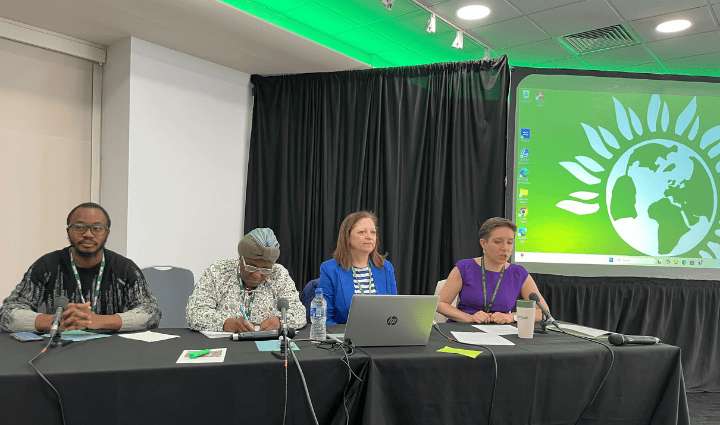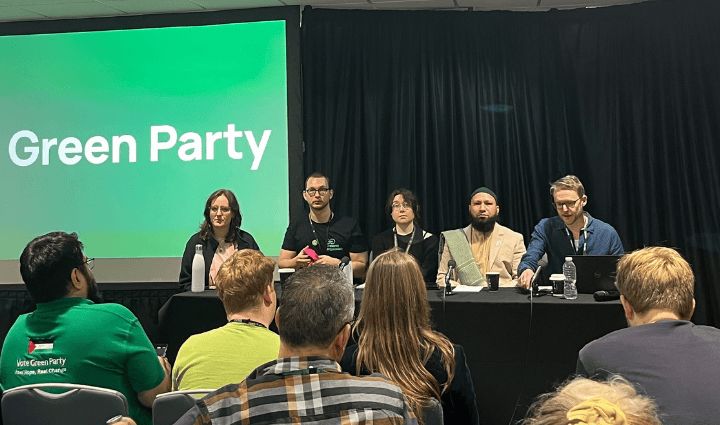Green Party Conference 2025: framing a positive message around migrants
With four MPs successfully elected and nearly two million votes at the last general election, it has been a record-breaking year for the Green Party. Last weekend, for the first time, the Work Rights Centre joined the Green Party conference in Bournemouth, presenting the case for why migrants and vulnerable workers’ issues should be at the forefront of their policy agenda.
As the party energises itself under the new leadership of Zack Polanski, we reflect on the conference messages, and the new opportunities created for migrants’ and workers’ rights advocates.
A positive message on migration
The message from the Greens on migration was in stark contrast to that of the Labour government and other political parties in recent weeks. Zack Polanski used his leader’s speech to talk about his family’s own migrant history, highlight the positive contributions of migrants to Britain’s economy and society, while also encouraging members to join him in a chant of “migrants and refugees are welcome here”.
At a fringe event focused on Hostile Environment policies, Green MP Carla Denyer opened her remarks by highlighting how her party has always pushed back on successive governments’ use of hostile environment policies. She mentioned that for too long, governments have obsessively focused the migration debate around absolute numbers. She reiterated the Greens position that immigration policy needs to be taken outside of the remit of the Home Office, which has effectively treated the issue of migration as a crime.
Munya Radzi, founder of the organisation Regularise, discussed how undocumented individuals had been left out of the immigration debate for years, with hostile environment policies designed to physically and mentally break individuals who had fallen out of status. He called out the government’s recent immigration white paper, which is already having an effect by reducing the range of eligible occupations under the Skilled Worker visa. Munya also described how migrant workers are often denied their employment rights in practice by a visa system that denies them the autonomy to raise grievances or to change employers with relative ease.
Though issues of migrant worker exploitation were not explored in detail, it was positive to see widespread agreement that ambitious reform of the UK immigration system is urgently needed.

Fringe session - A Hostile Environment: a migrant led discussion on state violence in the asylum and immigration system - Left to Right - Munya Radzi (Regularise), Olivia (campaigner currently with Praxis), Nazek Ramadan (Founder at Migrant Voice), Carla Denyer MP
The workers’ rights agenda: charting new territory?
A number of sessions at the conference focused on the Green Party’s relationship to both the issue of workers’ rights and the trade union movement. Ultimately, the view from the Greens is that the Labour government has left workers’ interests behind, creating an opportunity for the Greens to deliver where this government has failed.
In a fringe session on this topic, deputy leader Mothin Ali reflected on his father’s involvement in organising for the miners strikes of the 1980s. He described how the party needs to work in tandem with the trade union movement.
Kate Jones, the party’s trade union liaison officer, highlighted two issues. First, it is difficult to persuade senior union leaders to become more involved with the party. Second, the Greens have historically lacked a cultural relationship with the labour movement.
She described how development of artificial intelligence is likely to become one of the greatest challenges for workers in upcoming years, highlighting this as an opportunity for the Greens to develop a leadership role advocating for workers’ rights and protections.
A representative from UNITE the union referenced how moving towards a ”just green transition” is inherently linked to issues around job security and worker protection. She argued that the party needs to engage seriously with these policy issues in sectors like energy and the automotive industry, if it is to appeal to workers.

Fringe session: The Greens and Trade Union Movement, towards a workers agenda. Left to right - Megan (Unite the Union), Steve Jackson (Greens Organise), Kate Jones (Greens Trade Union Liaison Officer), Mothin Ali (Greens Deputy Leader), Will Pickering (UCU)
A new approach to government
It was interesting to observe how, amongst the focus on workers’ rights and immigration, fringe events also reflected on the ever-polarising state of democracy and voters’ confidence in our system of government.
Dr Tabitha Baker from Bournemouth University presented on why emotions, rather than policies, are currently driving issues of political trust and distrust. Her observation that themes of recognition, belonging and simplicity have become important drivers of political support among those who have become disillusioned by the political system will have chimed with many observers who, like ourselves, watched in disbelief how the government adopts an increasingly anti-migrant approach.
Other sessions that reflected on the Green Party’s manifesto commitments to introduce proportional representation, reform the House of Lords, and move towards a written constitution to safeguard our existing rights and protections provided some insight into the party’s bigger vision for government, and the overarching ambition to reclaim the progressive arena.
Where do the Greens stand on House of Lords reform?
At a “Meet the Peers” session, current Green peers Natalie Bennett and Jenny Jones spoke about their attempts at reforming the House of Lords, but also some redeeming features of the second chamber.
They spoke about the usefulness of Lords’ amendments being able to be debated in full, rather than in the Commons where amendments are often selected for debate by the Speaker. Similarly, both mentioned the benefit of having crossbenchers as experts to scrutinise different aspects of legislation, but that their presence did not outweigh the democratic deficit of not having an elected second chamber.
Both mentioned that despite the Greens’ small presence in the House of Lords, they were able to build consensus with other peers on specific subject matters, but that working with other members was ultimately a tricky balancing act. They did however note that other peers had become “greener” over time, in terms of their contributions to debates and legislative scrutiny.
Can Greens keep up the momentum?
It is hard to overstate the energy in Bournemouth, and the sense of possibility in the air. While the Green’s influence on legislation and policy is limited, given they are one of the smallest parties in the House of Commons, their allyship matters.
The party’s support for ambitious reforms in the area of migrants’ rights and, increasingly, employment, will provide some comfort to migrant communities who have been shocked by the Labour government’s harsh rhetoric and plans to restrict routes to settlement.
Green peers can also use their position to scrutinise legislation and raise awareness of systemic change needed, even if their power to enact change is limited. The party has seen a vast surge in members, following Zack Polanski’s leadership election. For their members, and all those whose causes they champion, the crucial question is whether the Greens can keep up the momentum.
Now read how this compared to the Labour Party Conference 2025...
